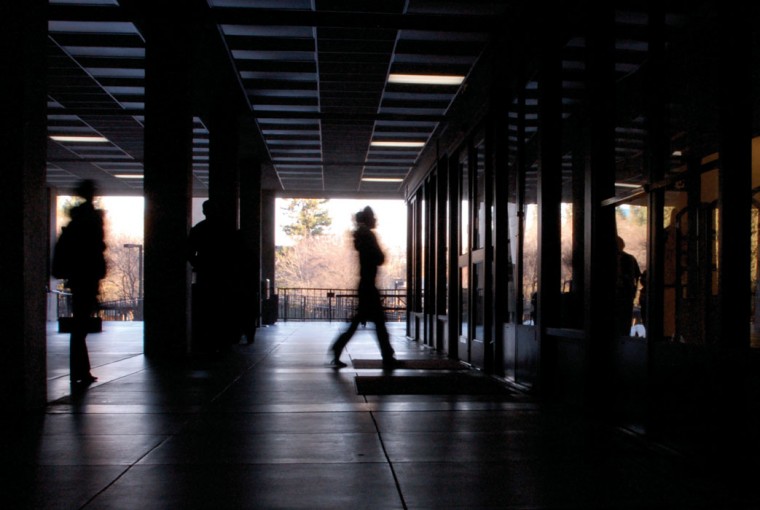Library Security Questioned
The Library Breezeway is the location where a female student was allegedly assaulted by a homeless man on Feb. 10.:
March 21, 2007
Student safety and the effectiveness of Sacramento State’s security policy have been called into question following last month’s assault involving Michael Vo, a homeless man, and a female student.
The incident, which occurred in the Library Breezeway on Feb. 10 and involved accusations of forcible fondling of a female student’s breast, gained negative attention from Sac State students, parents and community members after Vo was released from jail. He was allowed back on campus after seven days, as is outlined in section 626.6 in the California Penal Code.
Junior business major Kati Davis said that Vo being allowed back on campus after seven days was wrong.
“(It) is extremely unfair,” Davis said. “Why should he be let back on campus at all? So he can attack someone else?”
Sgt. Kelly Clark of the University Police Department said under California PC 626.4, an officer cannot ask a person to leave a public campus without reasonable cause.
He said that it is the guidelines of that same penal code that limit the ability of University Police to handle incidents of sexual assault or violence in a more aggressive manner.
“I don’t like having people that I feel are threats on this campus,” Clark said. “I don’t like knowing that there are people on this campus who are (overly aggressive) and I don’t like knowing that there are students who go here who also happen to be convicted sex offenders. (That being said), I have to operate under the parameters of the law.”
Since the CSU system is primarily supported by taxpayer dollars, none of the 23 CSU campuses, including Sac State, are allowed to develop a policy that would keep members of the general public from accessing the campuses, according to the CSU website.
Library Assistant and Head of Library Security Frankie Michaelson said that as long as Sac State is a public campus, with a public library, there will be no security policies that regulate when a non-student or non-faculty member can be on campus or how close he or she can get to the Library.
Michaelson said the Library has an open-door policy.
“Any member of the community can come in and use our library. That is part of our mission statement,” Michaelson said. “As far as beefing up security around the library is concerned, we are always open to suggestions through our suggestions link on our webpage.”
Michaelson said that while he thinks that the open-campus and open-library policies are of great use to community members, he can also see the potential for danger.
“I would love to be able to tell you that this is a safe campus,” Michaelson said.
“Statistically, I would probably be right, but in reality we all know that we live in a world where bad people do bad things to innocent victims.” Michaelson said. “As much as we try to protect our students, we live and work on an open campus, and there is always the potential for one of our students to be victimized.”
Ethnic studies major Patricia Boyd said the response from University Police and Library security, as well as the overall handling of last month’s incident, has been sub par at best.
“Personally, I think that it’s a bunch of hogwash,” Boyd said. “To say it’s a public building, and that we can’t keep strange people out (is) a cop-out.”
On the UC Berkeley campus, which is often visited by tourists and people in the community, parts of the Moffitt/Doe Libraries are reserved for students and researchers.
However, Muhammed Bin-Mahfouz, a student security officer at the Moffitt/Doe library, said that while a student ID card is required to enter the Moffitt/Doe library, the restriction was set as a way to keep the library quiet for studying, not for safety.
Michaelson said while student safety is at the forefront of most people’s minds, including his own, he is also displeased with how homeless people have been treated and portrayed since the story of last month’s incident first broke.
“On one hand, I feel terrible that this had to happen,” Michaelson said. “On the other hand, I spent some time trying to picture myself in Michael’s shoes. His actions were completely unjustifiable, but the way society has abandoned him is also pretty horrific.”
Michaelson said last month’s occurrence was complex and that being homeless does not make one a predator or even a threat.
Bin-Mahfouz agrees with Michaelson’s assertion, saying that, in his experience as a student security officer, the potential for homeless people to harm students has been just as great as that of another student or anybody visiting the campus.
“The homeless, for the most part, pose no threat,” Bin-Mahfouz zsaid. “They are people we see every day?. Some days we get a situation between them, like situations with any other two people?. It’s not more common than that.”
Boyd said that while she does not mean to pre-judge homeless people, she feels that the safety of young women and all students should be placed above political correctness.
“I don’t mean to isolate (homeless) people, we’re probably all one paycheck away from being homeless, but I’m just really worried about the safety of women down there on campus,” Boyd said.
“We go to great measures to make sure that the campus and our students are as safe as they can be,” Clark said. “Keeping that in mind, our campus community is still reflective of the outside community.”
Mary Chou and Ashley Evans can be reached at [email protected]





























































































































